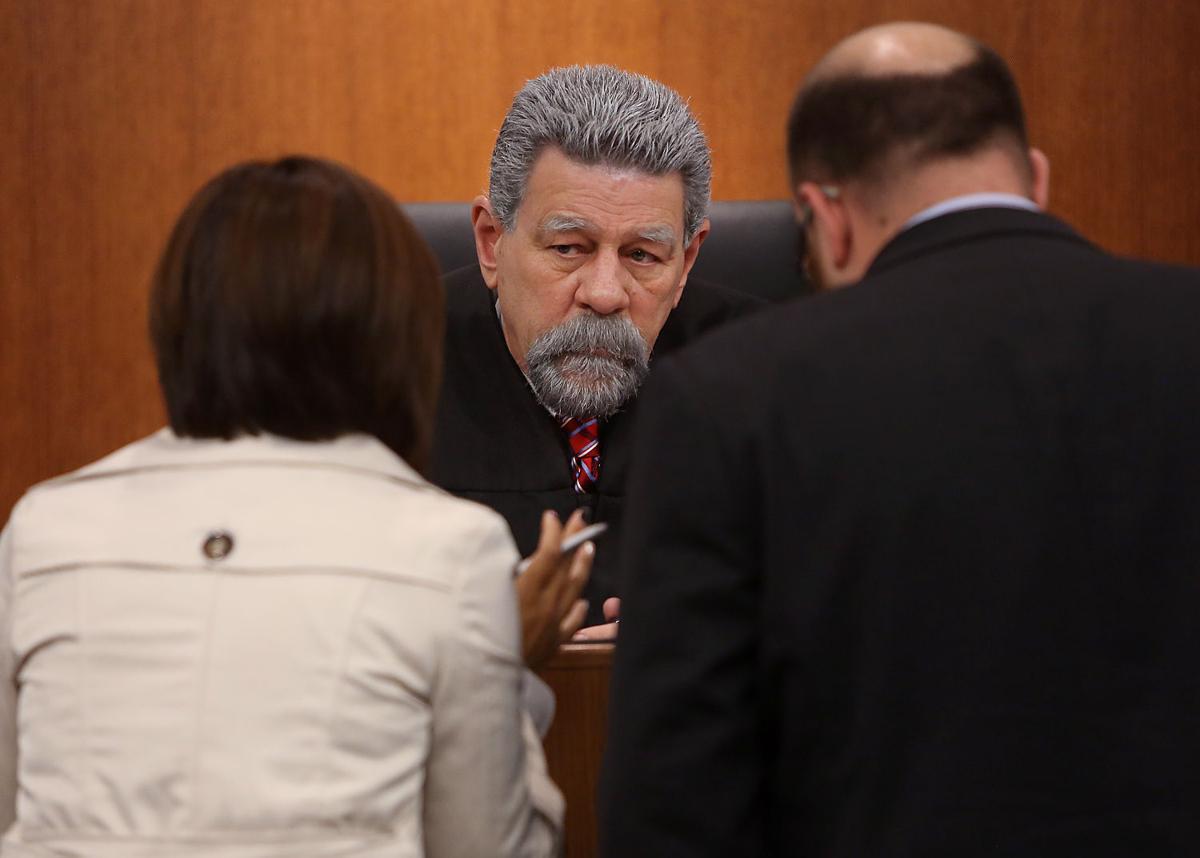The hearing was dragging on, but Justice of the Peace Jack Peyton wanted to be sure the young woman accused of a probation violation got his point.
“This is going to get better,” Peyton said Thursday morning in his courtroom at Pima County Justice Court. “I promise you this is going to get better. All you have to do is meet us halfway on this.”
It was typical Peyton — known in the Tucson area for his compassion and toughness in dealing with domestic-violence defendants. And it’s a performance that will be going away soon, as Peyton joins the ranks of departing justices of the peace.
Four departures have unleashed an uncommonly competitive set of races this year for the $101,000-per-year judge jobs.
Not only is Peyton declining to run for re-election, but so is longtime JP Carmen Dolny. Paul Simon is retiring at the end of this term, and Jose Luis Castillo retired part way into his four-year term.
This year, the only justice of the peace running for re-election to her seat is Maria Felix. Ten other candidates are running for the other four seats up for election this year. The five additional JP seats will be up for election in two years.
A split that runs through most of the races is attorneys vs. non-attorneys. In Arizona, you don’t have to be an attorney to run for justice of the peace and about half of them are not, statewide, but traditionally in Pima County most of our JPs have been members of the bar. And the attorneys like it that way.
“Even now I get calls from non-attorney judges all over the state asking for advice,” Castillo told me Thursday. “If you have the gumption to run for office, you ought to be able to handle it.”
In April, Vince Rabago, chairman of attorney Jeff Rogers’ campaign for justice of the peace, sent out a fundraising letter to lawyers, asking them to support Rogers.
“The need for a Justice Court judge to be a lawyer has never been greater,” he wrote, explaining how complicated the state law has become. “It is simply unrealistic to expect a person who lacks significant legal training and experience to master and apply this vast body of Arizona law.”
Rogers, a former Pima County Democratic Party chairman, is running against Paula Aboud, a former Democratic state senator and non-lawyer in a heavyweight primary that will determine the winner. She told me that in seven years as a senator, she was acting as a judge in a way that some attorneys never do.
Two other non-attorneys running for JP seats are serving now as elected constables. Vince Roberts is a retired University of Arizona police officer, and Jim Driscoll is retired from the Tucson Police Department.
“You’ve got a group of attorneys fighting against non-attorneys being on the bench,” Driscoll said.
He argued that as a retired law-enforcement officer, he’s better trained to view facts in an unbiased way, as opposed to attorneys who are trained to advocate.
Roberts decided to enter the race for Peyton’s seat in January, despite having told Peyton before that he wouldn’t challenge him. What changed Roberts’ mind, according to emails sent between Peyton and Roberts that month, was a bill introduced by state Rep. Darin Mitchell that would have eliminated the elected position of constable.
The bill went nowhere, but Peyton decided he didn’t want to fight for his seat. He explained the decision this way in an email forwarded to me by his wife, Laura:
“We are not political animals and are unwilling to stoop to the level required to engage in a contested race for Judicial Office that should not be subject to political machinations in the first place. We understand your ambitions, though, and harbor no ill will.”
The ill will appears to have ramped up since then, though. Justice of the Peace pro tem Ron Newman decided to challenge Roberts for the Republican nomination, and Laura Peyton publicly endorsed him on Facebook.
That led Roberts to file a complaint with the Commission on Judicial Conduct against Jack Peyton, arguing essentially that his wife’s involvement suggested Peyton himself was involved. The commission rejected the complaint last month.
Roberts also has a pending complaint against Newman, his opponent, arguing that Newman told a Republican gathering that Peyton had endorsed him. Newman denies he said that and says he sought legal counsel, who said he’s on solid ground.
“I’m comfortable the complaint is as frivolous as the one filed against Jack Peyton,” Newman told me.
And he argued that his 30 years of practicing law, including his time as a temporary judge at Justice Court, make him the better candidate. Roberts, on the other hand, said his life experience, especially his career in law enforcement, has prepared him.
You can expect to hear a similar argument from Priscilla Frisby. I ran into her Thursday while observing Peyton’s courtroom — she had a few clients with hearings.
Frisby told me she got into the primary race against Driscoll and Democrat Charlene Pesquiera at the suggestion of Castillo, the recently retired presiding judge at Justice Court. Castillo was concerned about the lack of an attorney in the race, she said.
A contract attorney handling mostly misdemeanor cases, Frisby spends most of every day at the court, she said. That’s what gives her the experience to handle the JP’s seat, she said, and shown her how a judge like Peyton can make a huge difference to defendants.
For some of her clients, she said, “he has changed their lives.”





